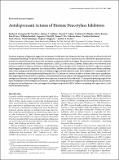Antidepressant Actions of Histone Deacetylase Inhibitors
Author(s)
Haggarty, Stephen J.; Covington III, Herbert E.; Maze, Ian; LaPlant, Quincey C.; Vialou, Vincent F.; Ohnishi, Yoshinori N.; Berton, Olivier; Fass, Daniel M.; Renthal, William; Rush III, Augustus J.; Wu, Emma Y.; Ghose, Subroto; Krishnan, Vaishnav; Russo, Scott J.; Tamminga, Carol; Nestler, Eric J.; ... Show more Show less
DownloadCovington-2009-Antidepressant Actio.pdf (2.122Mb)
PUBLISHER_POLICY
Publisher Policy
Article is made available in accordance with the publisher's policy and may be subject to US copyright law. Please refer to the publisher's site for terms of use.
Terms of use
Metadata
Show full item recordAbstract
Persistent symptoms of depression suggest the involvement of stable molecular adaptations in brain, which may be reflected at the level of chromatin remodeling. We find that chronic social defeat stress in mice causes a transient decrease, followed by a persistent increase, in levels of acetylated histone H3 in the nucleus accumbens, an important limbic brain region. This persistent increase in H3 acetylation is associated with decreased levels of histone deacetylase 2 (HDAC2) in the nucleus accumbens. Similar effects were observed in the nucleus accumbens of depressed humans studied postmortem. These changes in H3 acetylation and HDAC2 expression mediate long-lasting positive neuronal adaptations, since infusion of HDAC inhibitors into the nucleus accumbens, which increases histone acetylation, exerts robust antidepressant-like effects in the social defeat paradigm and other behavioral assays. HDAC inhibitor [N-(2-aminophenyl)-4-[N-(pyridine-3-ylmethoxy-carbonyl)aminomethyl]benzamide (MS-275)] infusion also reverses the effects of chronic defeat stress on global patterns of gene expression in the nucleus accumbens, as determined by microarray analysis, with striking similarities to the effects of the standard antidepressant fluoxetine. Stress-regulated genes whose expression is normalized selectively by MS-275 may provide promising targets for the future development of novel antidepressant treatments. Together, these findings provide new insight into the underlying molecular mechanisms of depression and antidepressant action, and support the antidepressant potential of HDAC inhibitors and perhaps other agents that act at the level of chromatin structure.
Date issued
2009-07Department
Picower Institute for Learning and MemoryJournal
Journal of Neuroscience
Publisher
Society for Neuroscience
Citation
Covington, Herbert E. et al. “Antidepressant Actions of Histone Deacetylase Inhibitors.” J. Neurosci. 29.37 (2009): 11451-11460. © 2009 Society of Neuroscience.
Version: Final published version
ISSN
0270-6474